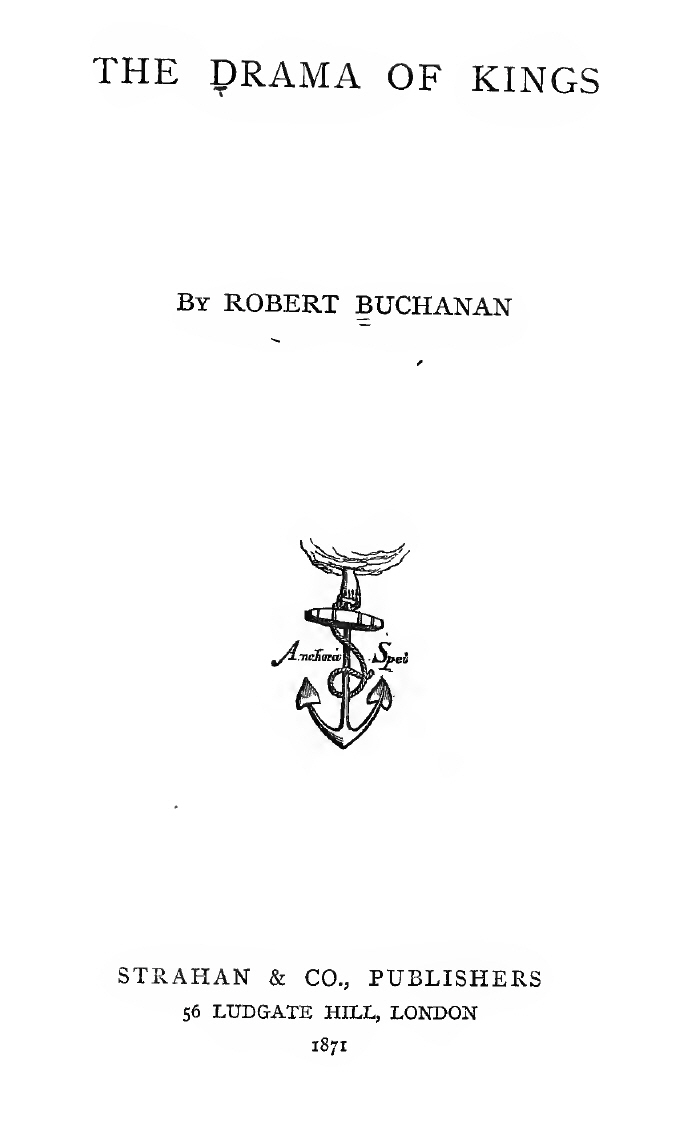ROBERT WILLIAMS BUCHANAN (1841 - 1901)
|
ROBERT WILLIAMS BUCHANAN (1841 - 1901) |
|
|
|
|
|
|
|
|
THE DRAMA OF KINGS
THE DRAMA OF KINGS.
“Te verò appello sanctissimum FLUMEN, tibique futura prædico: |
 |
|
THE DRAMA OF KINGS
BY ROBERT BUCHANAN
STRAHAN & CO., PUBLISHERS 56 LUDGATE HILL, LONDON 1871
LONDON:
_____
PAGE PROEM . . . . . . . . . xv PRELUDE BEFORE THE CURTAIN . . . . . 1 THE DRAMA OF KINGS: EPILUDE BEFORE THE CURTAIN . . . . . 431 __________ NOTES . . . . . . . . . 449 ON MYSTIC REALISM: A NOTE FOR THE ADEPT . . 463
[Notes: I call on thee, O most holy river, and predict to thee future events. Thou shalt burst forth with a torrent of blood, full even to thy banks, and thy divine waters shall not only be polluted with blood, but the land shall be inundated with it, and the number of the dead shall exceed that of the living. ... Why do you weep, O Asclepius? Robert Buchanan published Napoleon Fallen in January, 1871. In November of the same year he published The Drama of Kings, which was conceived as a trilogy with Napoleon Fallen forming the second part. The Drama of Kings was further revised for The Poetical Works of Robert Buchanan which was published in three volumes by Henry S. King in January, 1874. In Volume II, in a section entitled ‘Songs of the Terrible Year (1870)’, several extracts from The Drama of Kings were published with this explanatory note: *** These ‘Songs,’ inasmuch as they formed a portion of the ‘Drama of Kings,’ preceded by a long period the publication of Victor Hugo’s series under the same admirable title. The ‘Drama of Kings’ was written under a false conception, which no one discarded sooner than the author; but portions of it are preserved in the present collection, because, although written during the same feverish and evanescent excitement, they are the distinct lyrical products of the author’s mind, and perfectly complete in themselves. R. B.
These ‘songs’ were retitled and refer to the following sections in The Drama of Kings: ‘Ode To The Spirit Of Auguste Comte’: Dedication (pp. vii-xiii). ‘A Dirge For Kings’: Chorus (pp. 161-166). ‘The Perfect State’: Choric Epode (pp. 271-276). ‘The Two Voices’: from Choric Interlude: The Two Voices (pp. 265-269). ‘Ode Before Paris’: Chorus (pp. 281-284). ‘A Dialogue In The Snow’: from the dialogue between Chorus and A Deserter (pp. 321-332) ‘The Prayer In The Night’: Chorus (pp. 333-338) ‘The Spirit Of France’: Chorus (pp. 380-382) ‘The Apotheosis Of The Sword’: from the Scene inside the Hall of Mirrors (pp. 394-403). ‘The Chaunt By The Rhine’: from the same Scene, the dialogue between the Chorus and The Chiefs (pp. 407-417).
In Volume III of the 1874 The Poetical Works of Robert Buchanan a further revision of The Drama of Kings appeared as a section entitled ‘Political Mystics’. This new version comprised the following: POLITICAL MYSTICS TITAN AND AVATAR: A CHORAL MYSTIC This was followed by: L’ENVOI TO VOL.III THE CITY OF MAN
The four parts of ‘Titan and Avatar: A Choral Mystic’ correspond to the following sections of The Drama of Kings: The first part, ‘The Ode of Nations’ is the Chorus (pp. 47-54). The remaining three parts begin on Page 110 with Buonaparte’s soliloquy and continue with the Chorus sections to the end of Part I of The Drama of Kings. So, ‘The Avatar’s Dream’ is Buonaparte’s soliloquy (pp.110-128), ‘The Elemental Quest’ is the Chorus section (pp. 128-136), and ‘The Elemental Doom’ is the ‘Choric Interlude: The Titan’ (pp. 137-156). ‘The Fool of Destiny’ is a revised version of ‘Napoleon Fallen’ (pp. 157 - 260). ‘The Teuton Monologue’ is a combination of the two speeches by The Royal Chancellor (pp. 301-306, 308-315). ‘The Reply’ is the Chorus (pp. 315-321). ‘The City of Man’ now stands alone. It originally appeared as ‘The Final Chorus, or Epode’ of Napoleon Fallen, but in The Drama of Kings was revised and moved to the end of the poem where it appears as the ‘Epode’ (pp. 443-437). The essay on ‘Mystic Realism’ (pp. 463-471) is retained in the 1874 Poetical Works but the direct references to The Drama of Kings are removed and the essay is extended. In the 1884 Poetical Works, published by Chatto & Windus (and reprinted in 1901) ‘Political Mystics’ precedes ‘Songs of the Terrible Year’. In the former, ‘The City of Man’ appears as the final poem in the sequence, and the latter includes the explanatory note. ___
In Buchanan’s letter to Tennyson of 7th June, 1871, he wrote the following about The Drama of Kings: ‘... I have been sick & ailing for years—with horrible cerebral symptoms—& scarcely able to lift a pen; but last autumn I revived suddenly, & have worked hard all the winter at my “Drama of Kings,” an ambitious Trilogy, which Strahan is just publishing. For month after month I sacrificed all to this work—night after night, week after week—and I do not fear the result; but besides all else, I calculated on getting £300 in cash for the Drama. It seems, however, that my works have not been selling so well lately—there are changes, too, at Ludgate Hill—and my Publishers wont do more than issue the Book at half-profits. ... ___
The connection between Buchanan’s The Drama of Kings and Thomas Hardy’s The Dynasts is discussed in two essays from Publications of the Modern Language Association, ‘The Immediate Source of The Dynasts’ by Hoxie N. Fairchild and ‘The Original Source of Hardy’s Dynasts’ by John A. Cassidy. _____
Back to Poetry
|
|
|
|
|
|
|